Approach to management
Corporate governance strengthens our credibility as an entity listed on the WSE's regulated market, and thus the entire organization's competitive position. Therefore, we have a significant interest in implementing and complying with best practices.
We are concerned about the quality of our investor relations and make every effort to ensure that they are founded on equality and developed to the satisfaction of both sides, on the basis of unambiguous and reliable communication. The information policy of Grupa LOTOS and its subsidiaries focuses on effective support of our corporate governance objectives.
In 2005−2007, the Best Practices in Public Companies 2005 document, modified by general practice, discussions and the European Commission's recommendations, was used as a guide to corporate governance principles by companies wishing to nurture their long-term shareholder relations.
Best practices are principles designed to establish high standards of corporate governance, which thus help bring corporate supervision into line with EU standards.
From its stock market debut in June 2005, Grupa LOTOS adhered to most of the recommendations set out in this document. Then, since the beginning of 2008, it has followed the Code of Best Practice for WSE Listed Companies (more information), and its versions as amended by the WSE’s Supervisory Board in its Resolutions of October 19th 2011 and November 21st 2012, the latest of which has been in force since the beginning of 2013.
In line with disclosure requirements, the Company reports on instances of incidental or permanent non-compliance with corporate governance rules. The reports are published through the Electronic Information Base (EBI), and released in two languages on the Company's investor relations website. (more information)
In 2013, we complied with most of the obligatory corporate governance principles set forth in the Code of Best Practice for WSE Listed Companies. In line with the comply-or-explain principle, which provides that public companies should either comply with corporate governance rules or explain any instances of incidental or permanent non-compliance, Grupa LOTOS, acting under Par. 29.3 of the WSE Rules, released non-compliance reports via the EBI system, similarly to current reports.
On May 31st 2013, we reported non-compliance with Rules 10.1 and 10.2 of Section IV of the Code of Best Practice for WSE Listed Companies, on enabling shareholders to participate in General Meetings by means of electronic communication. We do not provide real-time broadcast of General Meetings or publish the recordings of their proceedings, in audio or video format, on our website, although recommended to do so by Section II.1.9a of the Code. (more information)
In our report, we explained that our Articles of Association do not provide for the possibility of participating in General Meetings by means of electronic communication. Further, we do not plan to make audio or video recordings of the proceedings of our General Meetings available, or to publish such recordings on our website, as we believe that our current methods of documenting the proceedings of the General Meeting already ensure the transparency of the Company's activities and protect the rights of all our shareholders. We publish adopted GM resolutions in current reports and releases posted on our website. Pursuant to Article 8.8 of the Company’s Articles of Association, the Board of Grupa LOTOS is authorised to make the decision, if any, to broadcast the proceedings of the General Meeting in real time. The possibility of ensuring compliance with the rules specified above will be examined in the future.
{GRI 4.4.}
We have in place mechanisms enabling our shareholders and employees to submit recommendations and other comments directly to members of the bodies supervising the correctness of the organization’s management processes. In line with the Polish Commercial Companies Code, the Articles of Association of Grupa LOTOS and the Rules of Procedure for its General Meeting address these issues in detail. They define the rules governing participation in the General Meeting and exercising voting rights, the manner of convening and closing the General Meeting, its opening and proceedings.
Shareholders, by virtue of their rights, may influence our operations and review the activities undertaken by the Company’s management and supervisory bodies.
A key shareholder right is the right to participate in the General Meeting, which accrues to all persons who are Company shareholders sixteen days prior to the date of the General Meeting, i.e. on the record date. Holders of registered shares and temporary certificates and pledgees and usufructees entitled to exercise voting rights are entitled to attend the General Meeting if they are entered in the register of shareholders at the record day.
Additionally, the right to participate in the General Meeting entitles shareholders to:
- submit motions prior to and during the General Meeting,
- request that certain items be placed on the agenda of the General Meeting,
- propose draft resolutions concerning items which have been or are to be placed on the agenda prior to the General Meeting,
- propose draft resolutions concerning items included in the agenda, or placed on the agenda during the General Meeting,
- take the floor during the General Meeting,
- object to or appeal against resolutions of the General Meeting.
Moreover, shareholders representing at least 1/20 of the share capital may request that an Extraordinary General Meeting be convened and certain items be placed on its agenda.
In addition to the requirements imposed by law, the rules laid down in the Code of Best Practice for WSE Listed Companies define mechanisms aimed to improve the quality of corporate relations with investors, while enhancing the protection of shareholder rights, also in matters falling outside the scope governed by law. They encourage companies to:
- post on their corporate websites detailed information on General Meetings, including reasons for calling off or postponing a Meeting, changes to a Meeting’s agenda together with reasons justifying such changes, notices of adjournment, shareholder questions relating to agenda items asked before and during a Meeting, as well as answers to such questions,
- ensure that General Meetings are attended by Supervisory Board and Board members,
- set the venue and date of General Meetings so as to enable the highest number of shareholders to participate,
- enable representatives of the press to be present at General Meetings.
In 2013, the Annual General Meeting was convened on June 28th 2013 as an Ordinary General Meeting of Grupa LOTOS and reviewed and approved the financial statements and directors’ report on the operations of the Company and of the LOTOS Group in 2012; and granted discharge in respect of performance of duties to Members of the Supervisory Board and Members of the Board. Moreover, the General Meeting granted its approval for the sale of organized parts of Grupa LOTOS business which were the fuel depots in Piotrków Trybunalski and Rypin.
During the Meeting, shareholder B. Kamola exercised his right to take the floor. The proposals and comments submitted by the shareholder related to the Company’s operations, primarily to financial and economic issues, the LOTOS Group strategy, the Yme project and the issue of fuel depots. Questions asked by the shareholder and answers provided by the Board have been published on the Company’s website. Moreover, the shareholder exercised his right to object to the resolution concerning approval of the directors’ report on the Company’s operations in the year ended December 31st 2012.





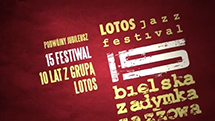








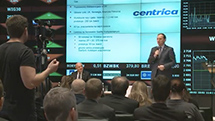
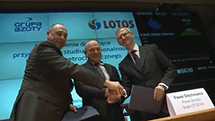

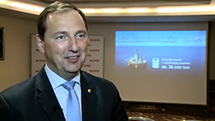
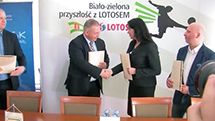




 E-mail
E-mail Facebook
Facebook Google+
Google+ Twitter
Twitter